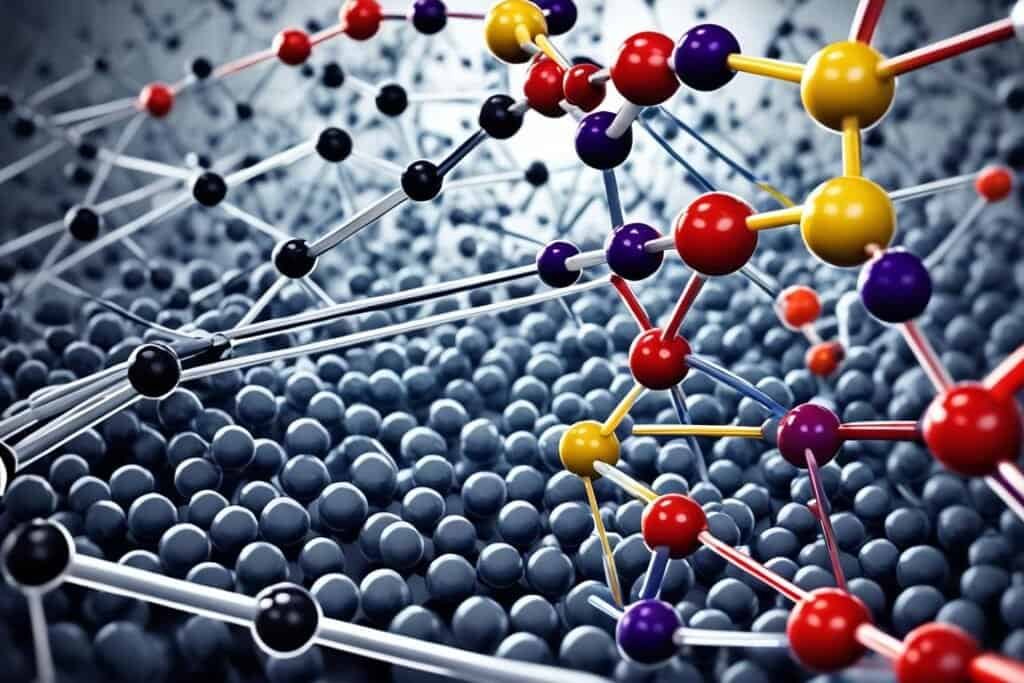Welcome to an insightful exploration of the fascinating relationship between cholesterol and testosterone. As you may know, cholesterol is often associated with heart health, but its role in hormone production is equally important. Today, we delve into how cholesterol affects testosterone levels, production, and balance, shedding light on the intricate connection between these two vital components of your hormonal system.
Key Takeaways:
- Cholesterol plays a crucial role in testosterone production and synthesis, serving as a substrate for enzymes involved in the process.
- Studies have explored the relationship between cholesterol and testosterone levels, emphasizing the need for a delicate balance between the two.
- The impact of statins, commonly prescribed cholesterol-lowering drugs, on testosterone levels is still not fully understood and requires further investigation.
- Hormonal imbalances resulting from cholesterol-testosterone fluctuations can have implications for overall health, including conditions such as PCOS and hypogonadism.
- Maintaining a healthy lifestyle, including regular exercise and a balanced diet, is crucial for managing cholesterol and testosterone levels.
The Role of Cholesterol in Testosterone Production
Cholesterol plays a vital role in the production and synthesis of testosterone. Numerous studies have highlighted the interdependence between cholesterol and testosterone levels in the body. It is noteworthy that the enzymes essential for testosterone synthesis, such as cytochrome P-450 and ACTH, rely on cholesterol as a substrate. This dependency underscores the significance of cholesterol in the process of testosterone synthesis.
Furthermore, the adrenal cortex, responsible for testosterone production, exhibits substantial mitochondrial cholesterol trafficking. This emphasizes the crucial role of cholesterol in facilitating the production of testosterone in the body. Through these intricate mechanisms, cholesterol contributes to the regulation and maintenance of testosterone levels, which in turn impacts various physiological functions in both males and females.

Table: Chemical Markers Related to Cholesterol and Testosterone Production
| Marker | Description |
|---|---|
| ACTH | A hormone that stimulates the release of cholesterol from the adrenal cortex, enabling testosterone production. |
| Cytochrome P-450 | An enzyme involved in the conversion of cholesterol into testosterone. |
| Cholesterol Trafficking | Mitochondrial transport of cholesterol within the adrenal cortex, supporting testosterone synthesis. |
The intricate relationship between cholesterol and testosterone production highlights the importance of cholesterol in maintaining hormonal balance. By understanding the role cholesterol plays in testosterone synthesis, we can better comprehend the impact cholesterol levels have on overall health and well-being.
Cholesterol and Testosterone Levels
Understanding the relationship between cholesterol levels and testosterone levels is crucial for maintaining a healthy hormonal balance. Numerous studies have delved into this connection, shedding light on the intricate interplay between cholesterol and testosterone.
Research suggests that higher cholesterol levels may be linked to increased testosterone production, illustrating the importance of achieving a delicate balance between cholesterol and testosterone. However, the specific mechanisms underlying this relationship and the optimal cholesterol levels for optimum testosterone production are still subjects of ongoing investigation.
While some studies have indicated that higher cholesterol levels may lead to elevated testosterone levels, it is essential to approach these findings cautiously. Cholesterol is a complex molecule with various implications for overall health and wellness. Striving for an optimal balance, rather than simply striving for higher cholesterol levels, is crucial for maintaining hormonal harmony.

Cholesterol and Testosterone Levels
| Cholesterol Levels | Potential Impact on Testosterone Levels |
|---|---|
| High | Possibly associated with increased testosterone production |
| Low | Potentially leading to decreased testosterone levels |
| Optimal | Enabling a balance between cholesterol and testosterone levels |
To fully comprehend the significance of cholesterol and testosterone levels, it is essential to consult with a healthcare professional who can help interpret these findings in the context of your specific health situation. They can guide you in optimizing your cholesterol and testosterone balance, ensuring overall well-being and hormonal harmony.
Impact of Statins on Testosterone Levels
Statins, a commonly prescribed class of drugs for lowering cholesterol, have been found to potentially lower testosterone levels. Research on the effect of statins on testosterone levels has shown mixed results, with some studies indicating no significant impact on testosterone levels in men, while others suggest potential beneficial effects in women with conditions such as polycystic ovary syndrome (PCOS).
Despite these findings, it is important to note that the certainty of the evidence surrounding the impact of statins on testosterone levels is currently low to very low. More studies are needed to provide clearer insights and establish conclusive evidence regarding this topic.
If you are concerned about the potential impact of statins on your testosterone levels, it is advisable to consult with your healthcare professional. They can help assess your individual situation and provide personalized guidance based on your specific needs and health conditions.
It is worth noting that managing cholesterol levels is important for overall health, and statins play a significant role in achieving this goal. However, it is essential to weigh the benefits of cholesterol management against potential effects on testosterone levels and have open discussions with your healthcare provider to make informed decisions.
In conclusion, while the relationship between statins and testosterone levels requires further investigation, it is important to approach this topic with caution and prioritize personalized medical advice. Monitoring your health, including regular check-ups and discussions with your healthcare provider, will help ensure a comprehensive approach to managing both cholesterol and testosterone levels.
Hormonal Imbalance and Health Implications
Imbalances in testosterone levels, including those influenced by cholesterol, can have various health implications. Hormonal imbalances can contribute to conditions such as Polycystic Ovary Syndrome (PCOS) in women and hypogonadism in men. Hormonal imbalances occur when there is either too little or too much testosterone in the body, disrupting the delicate balance required for optimal health.
PCOS is a common hormonal disorder in women and is characterized by irregular periods, obesity, and the development of cysts on the ovaries. It has been associated with high levels of testosterone and other androgens. This condition can lead to fertility issues, insulin resistance, and an increased risk of developing other health conditions such as type 2 diabetes and heart disease.
In men, low testosterone levels, also known as hypogonadism, can result in various symptoms such as decreased libido, fatigue, depression, and erectile dysfunction. Testosterone deficiency can impact not only sexual health but also lead to decreased bone density, muscle mass loss, and an increased risk of developing cardiovascular diseases.
Furthermore, disruptions in cholesterol metabolism and hormone synthesis can also impact overall health and wellness. Cholesterol serves as a precursor molecule for the production of various hormones, including testosterone. Any disruption in the synthesis or metabolism of cholesterol can lead to an imbalance in hormone production, affecting overall hormonal health.
It is essential to maintain a healthy hormonal balance to support proper bodily functions and overall well-being. Regular monitoring of hormone levels and seeking medical guidance when needed can help identify and address hormonal imbalances. Lifestyle modifications, including a balanced diet, regular exercise, stress management, and adequate sleep, may also contribute to maintaining a healthy hormonal balance.
Managing Cholesterol and Testosterone Levels
When it comes to maintaining optimal hormonal balance, managing cholesterol and testosterone levels plays a crucial role. By adopting a healthy lifestyle and making informed choices, you can take control of your hormone balance. Here are some lifestyle factors to consider:
- Regular Exercise: Engaging in regular physical activity has been associated with improved hormone balance. Incorporating activities such as cardiovascular exercises, strength training, and yoga into your routine can help regulate cholesterol and testosterone levels. Aim for at least 150 minutes of moderate-intensity exercise per week.
- Healthy Diet: A balanced and nutritious diet plays a significant role in managing cholesterol and testosterone levels. Include foods rich in healthy fats, such as avocado, nuts, and olive oil, as well as foods high in fiber, like fruits, vegetables, and whole grains. Avoid excessive consumption of processed foods, sugary snacks, and saturated fats.
- Weight Management: Maintaining a healthy weight is essential for hormone balance. Excess body weight, especially around the waist, can contribute to elevated cholesterol levels and disrupt testosterone production. Focus on achieving and maintaining a healthy body weight through a combination of regular exercise and a balanced diet.
- Stress Management: Chronic stress can impact hormone balance. Employ stress management techniques such as meditation, deep breathing exercises, or engaging in hobbies and activities that bring you joy. Prioritize self-care and make time for activities that help you relax and unwind.
- Sleep Quality: Quality sleep is vital for hormone regulation. Aim for 7-8 hours of uninterrupted sleep each night. Establish a regular sleep schedule, create a relaxing bedtime routine, and create a conducive sleep environment, free from distractions and electronic devices.
It is important to note that while these lifestyle factors can positively impact cholesterol and testosterone levels, consulting with a healthcare professional is essential. They can provide personalized guidance, monitor your hormone levels, and suggest appropriate treatment options if necessary.
By incorporating these lifestyle changes and seeking professional guidance, you can effectively manage cholesterol and testosterone levels, promoting overall health and well-being.
Conclusion
The relationship between cholesterol and testosterone is crucial for maintaining hormonal balance in the body. Research suggests that cholesterol plays a significant role in testosterone production and synthesis. Enzymes involved in testosterone synthesis rely on cholesterol as a substrate, underscoring the importance of cholesterol in this process.
While managing cholesterol levels is important, the impact of statins on testosterone levels requires further investigation. Studies have yielded mixed results, with the effects of statins on testosterone levels varying among individuals. More research is needed to provide clearer insights into this relationship.
Maintaining optimal cholesterol and testosterone levels is essential for overall health and well-being. Adopting a healthy lifestyle, including regular exercise and a balanced diet, can contribute to hormone balance and cholesterol regulation. It is also recommended to consult with a healthcare professional to discuss any concerns and explore appropriate treatment options.

